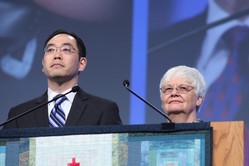Participants and observers of past Presbyterian Church (U.S.A.) General Assemblies have noted the tendency for debate to get bogged down in parliamentary gymnastics rather than focusing on the issues themselves.
To that end, the Committee to Review Biennial Assemblies suggested a new idea for the Assembly: allow commissioners time during plenary for discernment, small-group discussion and prayer about two contentious issues.
Commissioners were “yearning for a chance for people to simply talk without having issues on the table,” said Carol McDonald, moderator of the biennial review committee.
Moderator Heath Rada and Stated Clerk Gradye Parsons selected marriage/civil unions and the divestment from some companies operating in Israel/Palestine as the two issues to be discussed at the 221st General Assembly (2014).
For 90 minutes Thursday, commissioners heard short presentations from the related committees, asked questions of clarification and prayed and talked about the issues in small groups.
“This is not a debate. There is no vote. There are no deadlines,” said Susan Andrews, moderator of the 215th Assembly (2003), introducing the discussion period. “This is a time for discernment, not division.”
Commissioners were asked to answer two questions in their small groups: What did you hear that might lead someone to support the committee’s recommendation(s)? and What did you hear that might keep someone from supporting the committee’s recommendation(s)?
The biennial review committee felt it was important to ask commissioners to look at the pros and cons of each position, McDonald said.
“I thought it went well,” she said. “People seemed very engaged.”
Similar processes have been used in presbyteries and by ecumenical partners, McDonald said.
Whether the discussion period changed the tenor of the debate on the plenary floor will be seen at the Assembly’s end, but McDonald said she hopes the process will be repeated in the future.
“I would love it if we could discern, discern, discern and forget the parliamentary back and forth,” she said. “Just give people time to talk to each other.”

